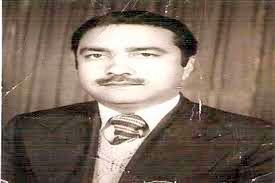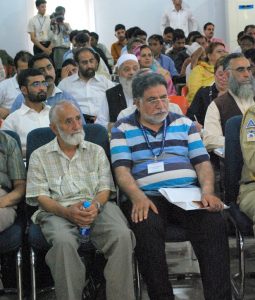Peace Watch » Editor's Take, Kashmir-Talk » Exiled Kashmiris: Story of Pain and Agony
Exiled Kashmiris: Story of Pain and Agony
PUNCHLINE
Deaths in Exile
By
Z.G. Muhammad
 In our agonized contemporary history there are many an untold ‘crippling stories of sorrow.’ Like many other struggling nations, we also have had our share of stories of exiles in 1819, 1846, 1947, 1965, and 1990 and after. Most of them will be never told. Sadly, the stories of pain and suffering of those exiled so far have not been themes of our poetry or subjects for our writers. The heart-wrenching experiences of the exiled people of our land have not found space in our narratives and equally have not been part of our political discourses.
In our agonized contemporary history there are many an untold ‘crippling stories of sorrow.’ Like many other struggling nations, we also have had our share of stories of exiles in 1819, 1846, 1947, 1965, and 1990 and after. Most of them will be never told. Sadly, the stories of pain and suffering of those exiled so far have not been themes of our poetry or subjects for our writers. The heart-wrenching experiences of the exiled people of our land have not found space in our narratives and equally have not been part of our political discourses.
Hundreds of the thousands of Kashmiri Muslims suffering brutal, bigotry and discriminatory tax system in the nineteenth century were coerced to leave their home and hearth and take refuge in the neighboring states of the British India. Living in ghettos these people sweltered and sweated in sizzling plains of India for making a living. Scores succumbed to the sunstrokes, and hundreds died in epidemics. Those surviving the torturous exiled life, even generation after their progeny making a mark in their life longed to return to their roots. The poet of the East, Allama Mohammad Iqbal has been a classical example. He even after having touched the peaks of the popularity in the British India and the world remained tethered to the roots- many his poems exude with longing for Kashmir.
However towering one becomes the sense of loss of the homeland is a terrifying experience. The life in the exile is ‘spiritually orphaned’ and emotionally alienated. It is like the scar of a deep wound that cannot be filled even at the last bath before the burial. As rightly put by Edward Said in his famous essay, ‘Reflections on Exile’ “It is the unhealable rift forced between a human being and a native place, between the self and its true home: its essential sadness can never be surmounted.”
The death of two youth resistance leaders of our student days in exile during past couple of months made me recognize that our historians, writers, and poets are largely yet to understand the dynamics of the exile to the resistance movement. The Palestine writers and scholars have produced scholarly works in this genre of the resistance literature. Palestine poets have written inspiring poetry on this subject that touch hearts even distant lands.
On Friday, March 17, 2017, Nazir Ahmed Wani, one of the founding member of a prominent post-1965 armed resistance group, Al Fatah died in the United States. The group founded in 1968, was unearthed in January 1971. Later after his release from Jail he had cofounded a youth organization the Jammu and Kashmir Peoples League. In mid-seventies, this party for opposing the Indra Gandhi and Sheikh Abdullah talks and subsequently Indira-Sheikh Agreement had come under sharp media focus and public attention. For the party opposing the arrangement for handing over power to Sheikh Mohammad Abdullah on the crutches of the same legislature whose election he had boycotted and burial of the grand old resistance organization the Plebiscite Front had earned it the wrath of the new dispensation in the State. For refusing to fall in line with the new power structure in the state made Nazir Wani suffer the exile like his father. In 1957, Prime Minister Bakshi Ghulam Mohammad had exiled his father Ghulam Rasool- a leader of the Political Conference to Pakistan and never ever allowed to return to his homeland.
 On May 23, 2017, another top exiled Al-Fatah leader Dr. Abdul Aala and a close associate of Nazir Wani died in Muzaffarabad. A doctor by profession who instead of choosing a comfortable life as a professional had chosen thorny path of the resistance. For his strong commitment to the cause he believed in and social activism he had carved a niche for himself in the South Kashmir and earned many admirers in the State. ‘He was coerced to go into exile in the early nineties and live on the other side of the line dividing the state. In exile, he lived an austere life with high commitment to his cause. A few years earlier on 24 August 1998, another of their compatriots in the Al Fatah Mushtaq Ahmed Wani an advocate from Pulwama also had breathed last in exile.
On May 23, 2017, another top exiled Al-Fatah leader Dr. Abdul Aala and a close associate of Nazir Wani died in Muzaffarabad. A doctor by profession who instead of choosing a comfortable life as a professional had chosen thorny path of the resistance. For his strong commitment to the cause he believed in and social activism he had carved a niche for himself in the South Kashmir and earned many admirers in the State. ‘He was coerced to go into exile in the early nineties and live on the other side of the line dividing the state. In exile, he lived an austere life with high commitment to his cause. A few years earlier on 24 August 1998, another of their compatriots in the Al Fatah Mushtaq Ahmed Wani an advocate from Pulwama also had breathed last in exile.
There are thousands of painful stories of those exiled who wanted to pass their last days in life in their native lands but were never allowed to return even for the burial. In last quarter of 1947, in Jammu, about half a million was massacred with the active connivance of the Maharaja and his Prime Ministers. Moreover, equally the same number driven across the border into Pakistan. Thousands of political activists and scores of intellectuals after October 27, 1947, from Kashmir province, were exiled for their political beliefs. The story of every individual: commoner, activist or leader banished from returning to his roots, living in his old neighborhood, dying in his ancestral home and sharing burial grounds with their ancestors is soul hurting.
There can be no denying that every exiled revolutionary wants to return to his land as a victor to see his dream realized. Nevertheless, howsoever, a political leader or a revolutionary may be committed to his cause that has caused his exile, on seeing death at his doorstep it is his wish to see his mortal remains buried in his ancestral graveyard. Because of the diplomatic standoff between New Delhi and Islamabad and bureaucratic rigmarole, the last wish of none of the exiled leader or activists was ever fulfilled. Some towering leaders and small time workers left a will that they should bury as Amanat (intrust) and after the freedom for final burial carried to their places of birth.
Here, I remember the story of Khawaja Abdul Ghaffar, a student leader of S.P. College and activists of the Muslim Conference who had been exiled to Pakistan in 1948. Some years back the old man then in his eighties after many years persuasion had been granted a visa for visiting Kashmir. During, his stay in Srinagar, he visited the newspaper office to share his last wish that he wanted to die in his ancestral home in the old city. Sensing death knocking at his door reportedly in early 2014 he had again applied for a visa for visiting Srinagar, but it was not granted. On June 24, 2014, he died in a Rawalpindi- carrying last wish with him.
Notwithstanding, their urge to return to their homelands- all exiled people in the world sing in unison:
“I wonder who will tell the loved ones that we have not forgotten them
That we in exile live nourished by their memory
Filed under: Editor's Take, Kashmir-Talk







